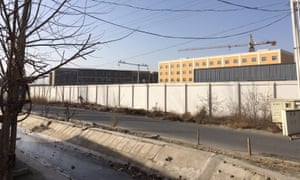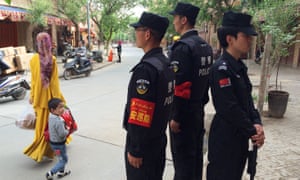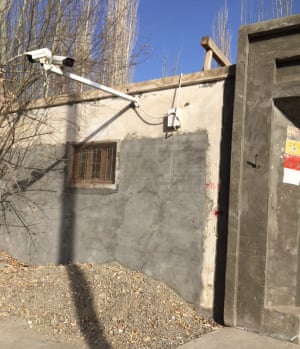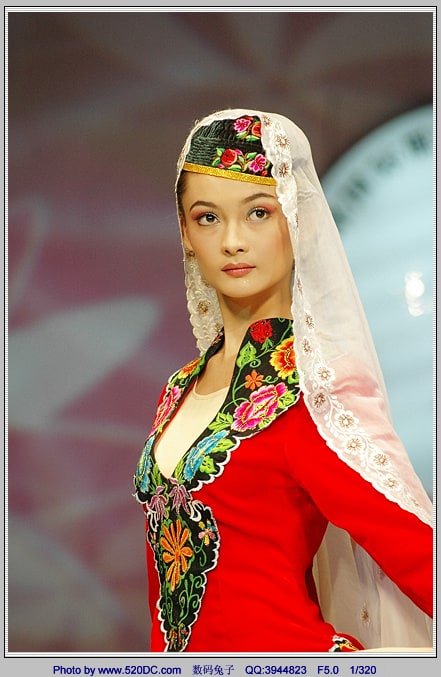Guardian: Kina vodi rat protiv Islama
Page 1 of 1
 Guardian: Kina vodi rat protiv Islama
Guardian: Kina vodi rat protiv Islama
'If you enter a camp, you never come out': inside China's war on Islam
Lily KuoLast modified on Fri 11 Jan 2019 23.56 GMT
The Luopu County No 1 Vocational Skills Training Centre is hard to miss. It emerges suddenly, a huge campus towering over hectares of farmland.
Outside the compound, surrounded by tall white concrete walls lined with barbed wire and surveillance cameras, a police car patrols while several guards carrying long batons stand watch. The centre, which straddles a highway, is bigger than most of the surrounding villages – about 170,000sq metres. A banner on one building says: “Safeguard ethnic unity.”
Half a dozen people stand on the roadside, staring at the buildings. No one is willing to say exactly what this prison-like facility is or why they are waiting on its perimeter.

Images of Xinjiang, China, taken in December as part of a Guardian investigation into the mass detention of Uighur Muslims in China. Photograph: Lily Kuo for the Guardian
“We don’t know,” says an older woman. Another woman has come to see her brother but declines to say more. A young girl with her two brothers announces they have come to see their father. Her mother quickly hushes her.
They are reluctant to talk because the building is not a formal prison or university, but an internment camp where Muslim minorities, mainly Uighurs, are sent against their will and without trial for months or even years.
Researchers and residents say southern Xinjiang, where the Luopu County No 1 Vocational Skills Training Centre is located, has borne the brunt of the government’s crackdown on Muslims because of its density of Uighurs and distance from major cities.
“We have a saying in Hotan: If you go into a concentration camp in Luopu, you never come out,” said Adil Awut*, from Hotan City, who is now living overseas.
In December, the United Nations asked for direct access to the camps after a panel said it had received “credible reports” that 1.1 million Uighurs, Kazakhs, Hui and other ethnic minorities had been detained.
Beijing has aggressively defended its policies and sought to portray the camps as benign and Xinjiang, where outbursts of violence occurred in the 1990s and 2000s, as peaceful thanks to government efforts.
A starkly different reality emerges in Luopu, also known as Lop county, where Guardian interviews with current and former residents and analysis of public documents reveal new details about the government’s continuing campaign in one of the worst-affected areas of Xinjiang.
Local authorities are expanding detention camps, increasing surveillance and policing, and co-opting residents through intimidation, force and financial incentives.
Luopu, a sparsely populated rural county of about 280,000 that is almost entirely Uighur, is home to eight internment camps officially labelled “vocational training centres”, according to public budget documents seen by the Guardian.

Police patrol the Old Town in Kashgar, to the west of Luopu county. Photograph: Tom Phillips for the Guardian
In 2018, officials expected to accommodate 12,000 “students” as well as another 2,100 inmates at another detention centre – a total of about 7% of the county’s adult population, or 11% of the entire male population.
Luopu county also planned to spend almost 300m yuan ($44m) on “stability control”, including almost $300,000 on a surveillance system to cover all mosques, and funding for almost 6,000 police officers to work in “convenient police stations” and security checkpoints, as well as to patrol residential areas.
The security measures and staggering costs underline China’s commitment to its controversial policies in Xinjiang despite growing criticism.
Across the province, domestic security expenses doubled in 2017 as the security campaign got under way, with spending on detention centres in counties with large concentrations of ethnic minorities quadrupling, according to Adrian Zenz, a researcher focused on China’s ethnic policies.
Budget overruns were common. Luopu county exceeded its budget by almost 300% in 2017, the highest increase in spending in all of Hotan prefecture.
Yet, the buildup continues. The Australian Strategic Policy Institute analysed 28 camps across Xinjiang and found they had expanded 465% in size since 2016, with the largest growth between July and September last year. Five camps in Hotan city and surrounding counties had at least doubled in size, with one camp increasing 2,469% between 2016 and 2018.
In Luopu, officials are bringing more than 2,700 assistant officers into the county’s 224 villages and townships. The “students” are closely monitored: almost 2,000 staff and police have been hired to oversee 12,000 detainees.
Authorities are also spending money on incentivising residents. Officials in Luopu hire local imams and other religious leaders as “patriotic religious people”, paid a yearly stipend of 4,200 yuan (about $600) in an area where average disposable income is 6,800 yuan a year. Their job is in part to stop residents from going on non-government organised pilgrimages to Mecca.
The relatively low-level assistant police, recruited mostly from Uighur communities, are paid 4,100 yuan a month, almost on a par with police in major cities.
Some local governments are struggling to maintain this pace of spending. In neighbouring Cele county, where authorities expected to have almost 12,000 detainees in vocational camps and detention centres, a budget for 2018 says: “There are still many projects not included in the budget due to a lack of funds. The financial situation in 2018 is very severe.”
As China’s economy slows, they may struggle even more. Zenz said: “The sustainability of this system basically depends on the financial capabilities of the central government … The long-term financial sustainability of all these top-down measures is certainly questionable.”
In Luopu, like many places in Xinjiang, the movements of Uighur residents are restricted. While Han Chinese are waved through security checkpoints, Uighur commuters register their ID cards, do full body scans, have their vehicles searched and their faces scanned.

CCTV monitoring on a street corner in Luopu county. Photograph: Lily Kuo for the Guardian
Hand-held devices scan smartphones for content deemed problematic. A police officer demanded to check the phone of a Guardian reporter because, she said “someone saw Arabic or Uighur language on it”.
Abdulla Erkin*, born and raised in Luopu county, was living in Urumqi, in the north of Xinjiang, when the crackdown began in earnest. He says his family warned him not to return. “They all told me: ‘Don’t come here. Don’t come here. Just live in Urumqi.’” His sister, who works in a local government bureau in Luopu told him: “It’s worse day after day.”
Erkin says most of his friends have been sent to a camp or prison. Now living overseas, he discovered last month that two of his brothers had been detained, and he fears five of his nephews have also gone. A Uighur businessman living in north-eastern China told the Guardian he left Hotan because of the constant threat of being detained.
“My sense as well is that the counties of Hotan prefecture have been the target of most severe repression,” said Darren Byler, a lecturer at the University of Washington who has been focusing on Xinjiang. “From the perspective of the state, Hotan is framed as the most ‘backward and resistant’.”
Chinese officials have said international observers are “welcome to Xinjiang”, but Guardian reporters were questioned by police in Luopu for four hours and followed by at least seven people in Hotan City.
An official at the police station adjoining the No 1 Vocational Training Centre told the Guardian “all reporters, foreign or Chinese, from outside Xinjiang” were subject to their security measures.
Over the past year, Luopu local officials have gathered villagers to sing patriotic songs, a practice common in the camps, or to teach female residents how to be “good new era women” who promote “ideological emancipation”.
But it’s not clear that these initiatives are what have inspired obedience.
A woman burning a pile of branches lists people in her family who have been sent “to training”, including her 16-year-old son. Another woman says her husband has been in training in a different village since December 2017. She doesn’t know why he was sent. “We have always been farmers,” she says.
A man carrying plastic bags of naan and skewers explains that his neighbour has gone to the training centre. He suddenly interrupts himself: “We are scared talking with you.” He says: “They will retaliate.”
* Name has been changed to protect the identity of the interviewee
Lily KuoLast modified on Fri 11 Jan 2019 23.56 GMT
The Luopu County No 1 Vocational Skills Training Centre is hard to miss. It emerges suddenly, a huge campus towering over hectares of farmland.
Outside the compound, surrounded by tall white concrete walls lined with barbed wire and surveillance cameras, a police car patrols while several guards carrying long batons stand watch. The centre, which straddles a highway, is bigger than most of the surrounding villages – about 170,000sq metres. A banner on one building says: “Safeguard ethnic unity.”
Half a dozen people stand on the roadside, staring at the buildings. No one is willing to say exactly what this prison-like facility is or why they are waiting on its perimeter.

Images of Xinjiang, China, taken in December as part of a Guardian investigation into the mass detention of Uighur Muslims in China. Photograph: Lily Kuo for the Guardian
“We don’t know,” says an older woman. Another woman has come to see her brother but declines to say more. A young girl with her two brothers announces they have come to see their father. Her mother quickly hushes her.
They are reluctant to talk because the building is not a formal prison or university, but an internment camp where Muslim minorities, mainly Uighurs, are sent against their will and without trial for months or even years.
Researchers and residents say southern Xinjiang, where the Luopu County No 1 Vocational Skills Training Centre is located, has borne the brunt of the government’s crackdown on Muslims because of its density of Uighurs and distance from major cities.
“We have a saying in Hotan: If you go into a concentration camp in Luopu, you never come out,” said Adil Awut*, from Hotan City, who is now living overseas.
In December, the United Nations asked for direct access to the camps after a panel said it had received “credible reports” that 1.1 million Uighurs, Kazakhs, Hui and other ethnic minorities had been detained.
Concerned Scholars of Xinjiang (@XJscholars)
Internees listening to speeches at Lop County number 4 re-education center ("洛浦县第四教育培训中心") in March of 2017. pic.twitter.com/2oDlZyMjVj
August 20, 2018
Beijing has aggressively defended its policies and sought to portray the camps as benign and Xinjiang, where outbursts of violence occurred in the 1990s and 2000s, as peaceful thanks to government efforts.
A starkly different reality emerges in Luopu, also known as Lop county, where Guardian interviews with current and former residents and analysis of public documents reveal new details about the government’s continuing campaign in one of the worst-affected areas of Xinjiang.
Local authorities are expanding detention camps, increasing surveillance and policing, and co-opting residents through intimidation, force and financial incentives.
The cost of ‘stability control’
In the past year, at least 10 buildings have been added to the No 1 Vocational Skills Training Centre, according to satellite imagery. Construction work on the camp, identified through company records found by the University of British Columbia student Shawn Zhang, was still being carried out when the Guardian visited in mid-December.Luopu, a sparsely populated rural county of about 280,000 that is almost entirely Uighur, is home to eight internment camps officially labelled “vocational training centres”, according to public budget documents seen by the Guardian.

Police patrol the Old Town in Kashgar, to the west of Luopu county. Photograph: Tom Phillips for the Guardian
In 2018, officials expected to accommodate 12,000 “students” as well as another 2,100 inmates at another detention centre – a total of about 7% of the county’s adult population, or 11% of the entire male population.
Luopu county also planned to spend almost 300m yuan ($44m) on “stability control”, including almost $300,000 on a surveillance system to cover all mosques, and funding for almost 6,000 police officers to work in “convenient police stations” and security checkpoints, as well as to patrol residential areas.
The security measures and staggering costs underline China’s commitment to its controversial policies in Xinjiang despite growing criticism.
Across the province, domestic security expenses doubled in 2017 as the security campaign got under way, with spending on detention centres in counties with large concentrations of ethnic minorities quadrupling, according to Adrian Zenz, a researcher focused on China’s ethnic policies.
Budget overruns were common. Luopu county exceeded its budget by almost 300% in 2017, the highest increase in spending in all of Hotan prefecture.
Yet, the buildup continues. The Australian Strategic Policy Institute analysed 28 camps across Xinjiang and found they had expanded 465% in size since 2016, with the largest growth between July and September last year. Five camps in Hotan city and surrounding counties had at least doubled in size, with one camp increasing 2,469% between 2016 and 2018.
In Luopu, officials are bringing more than 2,700 assistant officers into the county’s 224 villages and townships. The “students” are closely monitored: almost 2,000 staff and police have been hired to oversee 12,000 detainees.
Authorities are also spending money on incentivising residents. Officials in Luopu hire local imams and other religious leaders as “patriotic religious people”, paid a yearly stipend of 4,200 yuan (about $600) in an area where average disposable income is 6,800 yuan a year. Their job is in part to stop residents from going on non-government organised pilgrimages to Mecca.
The relatively low-level assistant police, recruited mostly from Uighur communities, are paid 4,100 yuan a month, almost on a par with police in major cities.
Some local governments are struggling to maintain this pace of spending. In neighbouring Cele county, where authorities expected to have almost 12,000 detainees in vocational camps and detention centres, a budget for 2018 says: “There are still many projects not included in the budget due to a lack of funds. The financial situation in 2018 is very severe.”
As China’s economy slows, they may struggle even more. Zenz said: “The sustainability of this system basically depends on the financial capabilities of the central government … The long-term financial sustainability of all these top-down measures is certainly questionable.”
‘Don’t come here’
Today, Hotan prefecture is under “grid style” management, involving intense policing and mass surveillance. On the Luopu government website, it is described as “often in a state of level one or two response”, the highest state of emergency.In Luopu, like many places in Xinjiang, the movements of Uighur residents are restricted. While Han Chinese are waved through security checkpoints, Uighur commuters register their ID cards, do full body scans, have their vehicles searched and their faces scanned.

CCTV monitoring on a street corner in Luopu county. Photograph: Lily Kuo for the Guardian
Hand-held devices scan smartphones for content deemed problematic. A police officer demanded to check the phone of a Guardian reporter because, she said “someone saw Arabic or Uighur language on it”.
Abdulla Erkin*, born and raised in Luopu county, was living in Urumqi, in the north of Xinjiang, when the crackdown began in earnest. He says his family warned him not to return. “They all told me: ‘Don’t come here. Don’t come here. Just live in Urumqi.’” His sister, who works in a local government bureau in Luopu told him: “It’s worse day after day.”
Erkin says most of his friends have been sent to a camp or prison. Now living overseas, he discovered last month that two of his brothers had been detained, and he fears five of his nephews have also gone. A Uighur businessman living in north-eastern China told the Guardian he left Hotan because of the constant threat of being detained.
“My sense as well is that the counties of Hotan prefecture have been the target of most severe repression,” said Darren Byler, a lecturer at the University of Washington who has been focusing on Xinjiang. “From the perspective of the state, Hotan is framed as the most ‘backward and resistant’.”
Chinese officials have said international observers are “welcome to Xinjiang”, but Guardian reporters were questioned by police in Luopu for four hours and followed by at least seven people in Hotan City.
An official at the police station adjoining the No 1 Vocational Training Centre told the Guardian “all reporters, foreign or Chinese, from outside Xinjiang” were subject to their security measures.
‘Red star’ households
In a village in Luopu county, almost every home has a plaque on the door marking it a “model red star family”. These are families who have met requirements, including demonstrating “anti-extremism thought” and a “sense of modern civilisation”.Over the past year, Luopu local officials have gathered villagers to sing patriotic songs, a practice common in the camps, or to teach female residents how to be “good new era women” who promote “ideological emancipation”.
But it’s not clear that these initiatives are what have inspired obedience.
A woman burning a pile of branches lists people in her family who have been sent “to training”, including her 16-year-old son. Another woman says her husband has been in training in a different village since December 2017. She doesn’t know why he was sent. “We have always been farmers,” she says.
A man carrying plastic bags of naan and skewers explains that his neighbour has gone to the training centre. He suddenly interrupts himself: “We are scared talking with you.” He says: “They will retaliate.”
* Name has been changed to protect the identity of the interviewee

Hektorović- Posts : 26373
2018-04-10
 Re: Guardian: Kina vodi rat protiv Islama
Re: Guardian: Kina vodi rat protiv Islama
We can’t keep ignoring human rights abuses against Uighur Muslims
A mere week after millions around the globe celebrated the new year and basked in the company of their loved ones, many Uighur Muslim families have had no such luck. They’re falling apart, snatched from each others grips at the hands of Chinese authorities. And for those who have family members who have yet to be sent away to camps, maintaining contact is as risky as ever.
I used to live in Xinjiang (also known as East Turkestan), and fled with my family once the authorities escalated their cruel tactics against my community. But we’re still hearing countless stories about relentless arrests from relatives and old friends.
A former neighbour of ours who also fled East Turkestan was recently informed about the arrest of their cousins from Urumqi. As of the last time we spoke, the whereabouts of their children remain unknown and no one is able to contact the cousins.
China’s security services are pressing members of the country’s Uighur minority abroad to spy on compatriots
The villagers are too afraid to even ask about anyone who has been taken to the camps because it could result them being detained too. Thousands of miles away, the only thing our families could do was pray for their wellbeing – this is how helpless we all feel.
And yet, too few know about our plight. It often feels like too few care. But the fact remains that China has imprisoned around 1 million of us in camps in an attempt to get us to forget our identities, whether it is our culture, our religion or both.
In order to defend its actions, the Chinese state media has started running propagandavideos, showing Uighurs somehow enjoying these camps, and referring to them as vocational training centres.
Chinese authorities are also trying to hack social media accounts of activists who speak out online about what’s really going on. My own Twitter account was attacked by the authorities to find my details – but I survived.
And there are other transparent PR tactics, such as the recent tour organised by Xinjiang authorities for diplomats from 12 countries. The idea being that by presenting the region as an “an open place”, as Chinese foreign ministry spokesperson Lu Kang said earlier this week, international anxieties over the situation will diminish.
But really, the only thing that China is drawing more attention to is the fact that only a select few are being allowed to visit the place, as opposed to those who really want to. If there are no skeletons in the closet then why not open it for the world to see?
Leaders around the world know about the deceiving tactics of CCP and still they are letting them continue with lies. A recent statement by Conservative MP Tom Tugendhat, who also chairs the foreign affairs committee, that the “execution of Muslims in western China is leading to a rise in jihadism that could easily have repercussions for us” shows how this issue is largely misunderstood by many.
The Uighur issue is not strictly about Islam; religion is just a part of it. Uighurs consist of millions of people who have been sent to torturous camps. We are being tormented because, in my opinion, East Turkestan is rich with resources that China needs for its own development.
This isn’t just about being seen to defend a religion but about saving a community who just want to live peacefully.
Few would welcome being stopped in the street, put in a cab, taken to jail and tortured just because they speak in a different language. We do not want anyone to name us as terrorists just because we follow a different entity than them.
Support free-thinking journalism and subscribe to Independent Minds
Uighurs want the world to stand for us not because we are Muslims, but because we are human. And if China is allowed to butcher a part of the human race so easily, then all the governments and organisations who claim to protect our rights have failed.
China is forcing Uighurs to obey it like slaves, forced labor has become common, the number of deaths in camps has increased and detainees are still being forced to learn communist songs and given minimal food to just keep them alive.
The real reason behind this torture is not to provide employment to Uighurs, but to get rid of them, and keep the place they call home occupied forever.
Today when others are free to roam, to live and enjoy their fundamental rights, Uighurs are subjected to illegal detention and brainwashing to denounce their very identity.
Xi Jinping is redefining suppression with Chinese characteristics and the world should not sit quiet. The only resolution that the world needs to take up is a real dedication to stand with all of us.
https://www.independent.co.uk/voices/uighur-muslim-detention-china-xinjiang-xi-jinping-human-rights-a8725141.html
As an Uighur Muslim myself, it feels like too few know or care about our plight. But with around 1 million of us detained in camps, now is not the time for inaction
1 day agoA mere week after millions around the globe celebrated the new year and basked in the company of their loved ones, many Uighur Muslim families have had no such luck. They’re falling apart, snatched from each others grips at the hands of Chinese authorities. And for those who have family members who have yet to be sent away to camps, maintaining contact is as risky as ever.
I used to live in Xinjiang (also known as East Turkestan), and fled with my family once the authorities escalated their cruel tactics against my community. But we’re still hearing countless stories about relentless arrests from relatives and old friends.
A former neighbour of ours who also fled East Turkestan was recently informed about the arrest of their cousins from Urumqi. As of the last time we spoke, the whereabouts of their children remain unknown and no one is able to contact the cousins.
China’s security services are pressing members of the country’s Uighur minority abroad to spy on compatriots
The villagers are too afraid to even ask about anyone who has been taken to the camps because it could result them being detained too. Thousands of miles away, the only thing our families could do was pray for their wellbeing – this is how helpless we all feel.
And yet, too few know about our plight. It often feels like too few care. But the fact remains that China has imprisoned around 1 million of us in camps in an attempt to get us to forget our identities, whether it is our culture, our religion or both.
In order to defend its actions, the Chinese state media has started running propagandavideos, showing Uighurs somehow enjoying these camps, and referring to them as vocational training centres.
Chinese authorities are also trying to hack social media accounts of activists who speak out online about what’s really going on. My own Twitter account was attacked by the authorities to find my details – but I survived.
And there are other transparent PR tactics, such as the recent tour organised by Xinjiang authorities for diplomats from 12 countries. The idea being that by presenting the region as an “an open place”, as Chinese foreign ministry spokesperson Lu Kang said earlier this week, international anxieties over the situation will diminish.
But really, the only thing that China is drawing more attention to is the fact that only a select few are being allowed to visit the place, as opposed to those who really want to. If there are no skeletons in the closet then why not open it for the world to see?
Leaders around the world know about the deceiving tactics of CCP and still they are letting them continue with lies. A recent statement by Conservative MP Tom Tugendhat, who also chairs the foreign affairs committee, that the “execution of Muslims in western China is leading to a rise in jihadism that could easily have repercussions for us” shows how this issue is largely misunderstood by many.
The Uighur issue is not strictly about Islam; religion is just a part of it. Uighurs consist of millions of people who have been sent to torturous camps. We are being tormented because, in my opinion, East Turkestan is rich with resources that China needs for its own development.
This isn’t just about being seen to defend a religion but about saving a community who just want to live peacefully.
Few would welcome being stopped in the street, put in a cab, taken to jail and tortured just because they speak in a different language. We do not want anyone to name us as terrorists just because we follow a different entity than them.
Support free-thinking journalism and subscribe to Independent Minds
Uighurs want the world to stand for us not because we are Muslims, but because we are human. And if China is allowed to butcher a part of the human race so easily, then all the governments and organisations who claim to protect our rights have failed.
China is forcing Uighurs to obey it like slaves, forced labor has become common, the number of deaths in camps has increased and detainees are still being forced to learn communist songs and given minimal food to just keep them alive.
The real reason behind this torture is not to provide employment to Uighurs, but to get rid of them, and keep the place they call home occupied forever.
Today when others are free to roam, to live and enjoy their fundamental rights, Uighurs are subjected to illegal detention and brainwashing to denounce their very identity.
Xi Jinping is redefining suppression with Chinese characteristics and the world should not sit quiet. The only resolution that the world needs to take up is a real dedication to stand with all of us.
https://www.independent.co.uk/voices/uighur-muslim-detention-china-xinjiang-xi-jinping-human-rights-a8725141.html

Hektorović- Posts : 26373
2018-04-10
 Re: Guardian: Kina vodi rat protiv Islama
Re: Guardian: Kina vodi rat protiv Islama
Treba sve poslati u britaniju da ih zaštite :D

epikur37- Posts : 45339
2015-08-06
 Re: Guardian: Kina vodi rat protiv Islama
Re: Guardian: Kina vodi rat protiv Islama
epikur37 wrote:Treba sve poslati u britaniju da ih zaštite :D
U Britaniji njeguju različitosti koji ih kulturno obogaćuju. Kinezi ih jednostavno preodgoje :)

catabbath-

Posts : 12438
2015-08-22
 Re: Guardian: Kina vodi rat protiv Islama
Re: Guardian: Kina vodi rat protiv Islama
bez brige prenio je to kod nas neki leftardski portal tipa jutarnji ili sto posto
uredno prenose propagandu guardiana
uredno prenose propagandu guardiana
_________________


marcellus- Posts : 46005
2014-04-16
 Re: Guardian: Kina vodi rat protiv Islama
Re: Guardian: Kina vodi rat protiv Islama
prenit će svi državno kontrolirani mediji(večernji, jutarnji, slobodna) a možda i index.hr radi profita
_________________
May Allah destroy Australia

AssadNaPodmornici- Posts : 22332
2018-06-14
 Re: Guardian: Kina vodi rat protiv Islama
Re: Guardian: Kina vodi rat protiv Islama
catabbath wrote:epikur37 wrote:Treba sve poslati u britaniju da ih zaštite :D
U Britaniji njeguju različitosti koji ih kulturno obogaćuju. Kinezi ih jednostavno preodgoje :)
+1 za kineze
_________________


marcellus- Posts : 46005
2014-04-16
 Re: Guardian: Kina vodi rat protiv Islama
Re: Guardian: Kina vodi rat protiv Islama
glupi kinezi
trebali su te novinare iz guardian-a optuzit za spijunazu I sverc droge I strpat ih u prdekanu da smrde dok cekaju strijeljanje
tob bila dobra vijest

trebali su te novinare iz guardian-a optuzit za spijunazu I sverc droge I strpat ih u prdekanu da smrde dok cekaju strijeljanje
tob bila dobra vijest


_________________
What looks like politics, and imagines itself to be political, will one day unmask itself as a religious movement (Soren Kierkegaard)

prckov- Posts : 34561
2014-04-19
 Re: Guardian: Kina vodi rat protiv Islama
Re: Guardian: Kina vodi rat protiv Islama
a što se ujgura tiče trebali bi emigrirat u britaniju gdje će njihova vjerska prava bit zaštićena
_________________


marcellus- Posts : 46005
2014-04-16
 Re: Guardian: Kina vodi rat protiv Islama
Re: Guardian: Kina vodi rat protiv Islama
je, a uzput da svrate do meke da dodu u englesku frisko osvjezeni kulturom kojom ce ih obogatitmarcellus wrote:a što se ujgura tiče trebali bi emigrirat u britaniju gdje će njihova vjerska prava bit zaštićena

prckov- Posts : 34561
2014-04-19
 Re: Guardian: Kina vodi rat protiv Islama
Re: Guardian: Kina vodi rat protiv Islama
marcellus wrote:bez brige prenio je to kod nas neki leftardski portal tipa jutarnji ili sto posto
uredno prenose propagandu guardiana
Ipak je to ugledni Guardian :)

Hektorović- Posts : 26373
2018-04-10
 Re: Guardian: Kina vodi rat protiv Islama
Re: Guardian: Kina vodi rat protiv Islama
marcellus wrote:a što se ujgura tiče trebali bi emigrirat u britaniju gdje će njihova vjerska prava bit zaštićena
Ujguri nisu kinezi.
The Uyghur (UIG) population, settled in Xinjiang, China, is a population presenting a typical admixture of Eastern and Western anthropometric traits. We dissected its genomic structure at population level, individual level, and chromosome level by using 20,177 SNPs spanning nearly the entire chromosome 21. Our results showed that UIG was formed by two-way admixture, with 60% European ancestry and 40% East Asian ancestry…Both the magnitude of LD and fragmentary ancestral chromosome segments indicated a long history of Uyghur. Under the assumption of a hybrid isolation (HI) model, we estimated that the admixture event of UIG occurred about 126 [107∼146] generations ago, or 2520 [2140∼2920] years ago assuming 20 years per generation. In spite of the long history and short LD of Uyghur compared with recent admixture populations such as the African-American population, we suggest that mapping by admixture LD (MALD) is still applicable in the Uyghur population but ∼10-fold AIMs are necessary for a whole-genome scan.
i bogami Uyghur žene su baš posebne

.jpg)










Guest- Guest
 Re: Guardian: Kina vodi rat protiv Islama
Re: Guardian: Kina vodi rat protiv Islama
marcellus wrote:bez brige prenio je to kod nas neki leftardski portal tipa jutarnji ili sto posto
uredno prenose propagandu guardiana
Evo ga...
https://www.jutarnji.hr/vijesti/svijet/tko-ovdje-jednom-ude-van-nikada-ne-izade-sto-se-zapravo-krije-iza-ograde-misterioznih-centara-za-preodgoj-u-koje-su-kinezi-strpali-milijun-ljudi/8267261/
[size=40]'TKO OVDJE JEDNOM UĐE, VAN NIKADA NE IZAĐE' Što se zapravo krije iza ograde misterioznih 'centara za preodgoj' u koje su Kinezi strpali milijun ljudi[/size]
Kineski ‘kamp za preodgoj’ u okrugu Luopu u regiji Xinjiang ne može se promašiti. Golemi zidovi, bodljikava žica, nadzorne kamere, policijske patrole, čuvari s dugim cijevima, i sve to usred velikog poljoprivrednog zemljišta. Nekoliko desetaka ljudi stoji ispred i gleda u zidove, no s novinarima Guardiana nitko nije htio razgovarati, niti o tome kakav je to zapravo kamp, niti zašto ondje čekaju.
- Ne znamo kakav je kamp - kaže jedna starija žena. Druga kaže da je došla vidjeti brata, no to je sve što će ispričati. Mlada djevojka nalazi se u društvu dvojice braće i kaže da su došli posjetiti oca. Majka je odmah ušutkava. Ljudi se boje govoriti jer se iza zidova ne nalazi službena institucija, zatvor ili koledž, već ‘centar za politički preodgoj’ gdje pripadnike muslimanskih manjina, uglavnom Ujgure, na mjesece ili čak godine zatvaraju protiv njihove volje i bez ikakvog sudskog ili kakvog drugog postupka, piše Guardian. Lokalno stanovništvo ima izreku:
- Uđete li u kamp u Luopu, nikad nećete izaći.
U prosincu je UN pozvao Kinu da dopusti nadzor nakon ‘duboko uznemirujućih’ optužbi o velikim logorima za preodgoj u kojima su zatvoreni Ujguri u Xinjiangu. Panel UN-a za ljudska prava objavio je da je primio vjerodostojna izvješća da se do milijun Ujgura, Kazaka, Hueja i pripadnika drugih etničkih manjina drži u ilegalnom pritvoru u toj kineskoj pokrajini te je pozvao na njihovo oslobađanje. Peking je reagirao brzo poručivši da se ‘Xinjiang suočava s ozbiljnim prijetnjama militanata i separatista’ te da vlasti poduzimaju korake da se otklone opasnosti. Tumači da nije riječ o zlostavljanju muslimana, nego o ‘zatvaranju ljudi zbog stručne obuke kako bi spriječili daljnje širenje militanata’.
Iza zidova
Novinari Guardiana stupili su u kontakt s bivšim zatvorenicima te analizirali javno dostupne dokumente kako bi otkrili što se zapravo skriva iza zidova. Lokalne vlasti nesumnjivo konstantno šire kampove i povećavaju nadzor, a istovremeno odvraćaju stanovnike od znatiželjnih pogleda i upita, i to korištenjem zastrašivanja, nasilja i financijskih poticaja, navodi list. Prošle je godine izgrađeno najmanje još deset pomoćnih zgrada u sklopu centra, pokazuju to satelitske snimke.
Okrug Luopu je slabo naseljen s oko 280.000 stanovnika, uglavnom Ujgura. Ondje se nalazi čak osam kampova, službeno nazvanih ‘centrima za preodgoj’. Prošle su godine vlasti smjestile oko 12.000 ‘učenika’, što je ukupno 7% odrasle populacije tog okruga, odnosno 11% ukupne muške populacije. Vlasti su značajna financijska sredstva utrošila i na sustav nadzora kojim će pokriti sve džamije, od nadzornih kamera do angažiranja oko 6.000 policajaca. Ulažu i u ‘patriotske vjernike’ koji bi trebali spriječiti lokalno stanovništvo da odlazi na hodočašće u Meku mimo onih koje organizira država.

Ben Blanchard / REUTERS
Nadzorne kamere na ulazu u džamiju u Xinjiangu
Kontrola
Osim toga, u Luopu je kretanje Ujgurima ograničeno. Dok Kinezi samo prolaze kroz kontrolne točke, Ujguri vade osobne iskaznice, prolaze pretragu cijelog tijela, pretražuju im vozila i skeniraju im lica. Policajac je zahtijevao pregled mobitela novinara Guardiana jer je, kaže, ‘netko vidio arapski ili ujgurski jezik na njemu’. Abdulla Erkin, rođen i odrastao u Luopu, neko je vrijeme živio u okrugu Urumqi na sjeveru Xinjianga, kad je počeo progon. Obitelj ga je upozorila da se ne vraća.
- Svi su mi rekli: Nemoj više dolaziti ovdje. Nemoj se vraćati. Samo ostani živjeti u Urumqiju.
Njegova sestra, koja radi u lokalnom vladinom uredu u Luopu, rekla mu je da je iz dana u dan sve gore. Erkin kaže da je većina njegovih prijatelja završila u kampu ili zatvoru. Prošli je mjesec otkrio da su mu zatvorili dvojicu braće, a boji se i da su mu nestala petorica nećaka. Ujgurski poduzetnik koji živi na sjeveroistoku Kine rekao je za Guardian da je napustio pokrajinu Hotan zbog konstantnih prijetnji.
- Meni se čini da se u Hotanu događaju najgore represije. Iz perspektive države Hotan se opisuje kao najzaostaliji, koji pruža najveći otpor - rekao je Darren Byler, predavač na Sveučilištu Washington koji proučava ovu tematiku. Kineske su vlasti rekle da su međunarodni promatrači dobrodošli u Xinjiang, no novinare Guardiana ispitivala je policija u Luopu četiri sata, a u gradu Hotanu su dobili pratnju sedmorice službenika. U policiji su im objasnili da svi novinari, strani ili kineski, koji nisu iz Xinjianga, prolaze ‘sigurnosne protokole’.

Thomas Peter / REUTERS
'Centar za preodgoj' u Xinjiangu
Strah
U jednom selu u okrugu Luopu gotovo svaka kuća na vratima ima oznaku ‘uzorne obitelji’ s crvenom zvjezdicom. Radi se o obiteljima koje su ‘zadovoljile kineske kriterije’. Lokalne vlasti potiču stanovništvo na pjevanje domoljubnih pjesama, što je praksa i u ‘centrima za preodgoj’, a žensko stanovništvo poučavaju kako biti ‘dobra žena nove ere’ koja promovira ideološku emancipaciju. Nije dokazano da su upravo te mjere motivirale stanovnike na poslušnost.
Jedna žena navodi niz osoba iz vlastite obitelji, odvedenih u kampove, uključujući 16-godišnjeg sina. Druga žena kaže da joj je muž na ‘preodgoju’ od prosinca 2017. Ne zna zašto su ga poslali ondje: - Oduvijek smo bili samo poljoprivrednici - kaže.
Muškarac objašnjava novinaru kako su mu susjeda poslali u kamp. Međutim, naglo zastaje i kaže: - Bojimo se razgovarati s vama. Osvetit će nam se.

Hektorović- Posts : 26373
2018-04-10
 Similar topics
Similar topics» Rat protiv islama smo već izgubili
» The Guardian - borba protiv klimatskih promjena
» Pišući knjigu protiv Islama preša na Islam
» Austrija osniva “centar za borbu protiv političkog islama”
» Macron obećao borbu protiv političkog islama u Francuskoj
» The Guardian - borba protiv klimatskih promjena
» Pišući knjigu protiv Islama preša na Islam
» Austrija osniva “centar za borbu protiv političkog islama”
» Macron obećao borbu protiv političkog islama u Francuskoj
Page 1 of 1
Permissions in this forum:
You cannot reply to topics in this forum
 Events
Events Latest images
Latest images
 by
by 